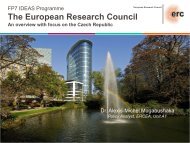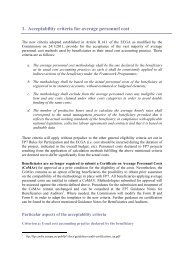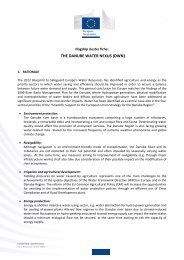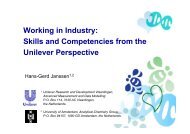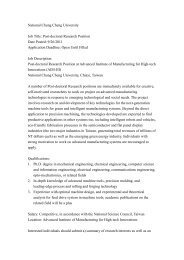Guide to Research and Innovation Strategies for Smart Specialisation
Guide to Research and Innovation Strategies for Smart Specialisation
Guide to Research and Innovation Strategies for Smart Specialisation
You also want an ePaper? Increase the reach of your titles
YUMPU automatically turns print PDFs into web optimized ePapers that Google loves.
Who: Putting entrepreneurial knowledge <strong>to</strong> work<br />
<strong>Smart</strong> specialisation addresses the difficult problem of prioritisation <strong>and</strong> resource allocation<br />
decisions by allowing entrepreneurial ac<strong>to</strong>rs <strong>to</strong> demonstrate the most promising areas <strong>for</strong> future<br />
regional development through what has been described as an 'entrepreneurial process of<br />
discovery.' 15 This process can reveal what a country or region does best in terms of R&D <strong>and</strong><br />
innovation because entrepreneurial ac<strong>to</strong>rs are best placed <strong>to</strong> know or discover what they are good<br />
at producing. This typically happens through trial <strong>and</strong> error <strong>and</strong> experimentation in new<br />
activities. Regions there<strong>for</strong>e need <strong>to</strong> pro-actively involve entrepreneurial ac<strong>to</strong>rs in strategy design<br />
<strong>and</strong> offer more incentives <strong>for</strong> risk taking.<br />
Entrepreneurial knowledge involves much more than science <strong>and</strong> technology. Rather, it<br />
combines <strong>and</strong> relates this <strong>to</strong> knowledge of market growth potential, likely competi<strong>to</strong>rs <strong>and</strong> the<br />
entire set of input <strong>and</strong> services required <strong>for</strong> launching a new business activity. The synthesis <strong>and</strong><br />
integration of this previously dispersed <strong>and</strong> fragmented knowledge should help <strong>to</strong> create a vision<br />
<strong>for</strong> opportunities in existing or new sec<strong>to</strong>rs. It is this type of knowledge that needs <strong>to</strong> be<br />
activated, mobilised <strong>and</strong> supported as the main ingredient in a process of smart specialisation.<br />
However, who has the entrepreneurial knowledge in the regional economy? It may be held by<br />
firms, which is often the case in 'advanced' regions rich in entrepreneurial experiments <strong>and</strong><br />
discoveries. In this case, the process of smart specialisation is likely <strong>to</strong> be more evident. Yet in<br />
many other cases where industry structures <strong>and</strong> entrepreneurial capabilities are weak, it is crucial<br />
that knowledge is identified <strong>and</strong> activated elsewhere, such as in universities or public research<br />
institutes. Collaborative projects with local firms can help <strong>to</strong> reveal in<strong>for</strong>mation about the future<br />
value of certain specialisations.<br />
Entrepreneurial ac<strong>to</strong>rs must there<strong>for</strong>e be unders<strong>to</strong>od in a broad sense <strong>to</strong> include inter alia firms,<br />
higher education institutions, public research institutes, independent innova<strong>to</strong>rs; whoever is best<br />
placed <strong>to</strong> discover the domains of R&D <strong>and</strong> innovation in which a region is likely <strong>to</strong> excel given<br />
its existing capabilities <strong>and</strong> productive assets. Given the importance of entrepreneurial<br />
experiments <strong>and</strong> discovery, there is no contradiction between a smart specialisation policy <strong>and</strong><br />
one <strong>to</strong> encourage entrepreneurship. On the contrary, these two policies are mutually rein<strong>for</strong>cing;<br />
without strong entrepreneurship, the strategy of smart specialisation will fail because of a deficit<br />
in the entrepreneurial knowledge needed <strong>to</strong> feed <strong>and</strong> nurture this strategy.<br />
How: Setting in motion regional change<br />
<strong>Smart</strong> specialisation strategies will usually require some sort of structural change, which could<br />
follow from one of the following not mutually-exclusive processes:<br />
15 This idea was introduced <strong>and</strong> is elaborated by Foray et al (2009) in '<strong>Smart</strong> <strong>Specialisation</strong> – The Concept', a Policy<br />
Brief of the Knowledge <strong>for</strong> Growth Expert Group advising the then Commissioner <strong>for</strong> <strong>Research</strong>, Janez Po<strong>to</strong>čnik.<br />
13



